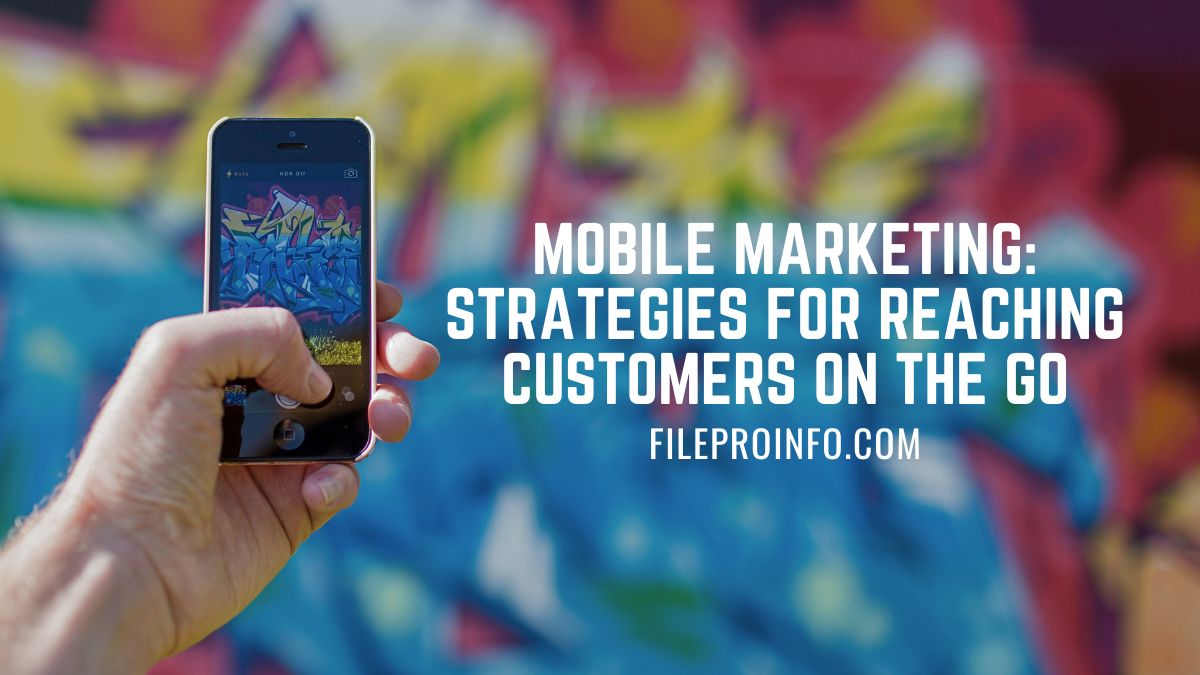
Mobile marketing has become an essential aspect of any digital marketing campaign. With the majority of internet users accessing the web via their mobile devices, it’s important to optimize your marketing efforts for this platform. Here are some strategies for reaching customers on the go with mobile marketing.
1. Create a mobile-friendly website:
In today’s mobile-driven world, having a mobile-friendly website is more important than ever. With the majority of internet users accessing content from their smartphones and tablets, your website must be optimized for mobile devices with responsive design and fast load times. By doing so, you can ensure that your site visitors have an enjoyable browsing experience while also benefiting from increased visibility in search engine rankings.
One of the most important aspects of a mobile-friendly website is responsive design. This means that your website will automatically adjust its layout to fit the screen size of different devices, providing a seamless experience for users no matter what device they’re using. Additionally, ensuring fast load times is key to keeping visitors engaged with your site. A slow-loading website can quickly turn off potential customers who are looking for quick access to information or products.
2. SMS marketing:
SMS (short message service) marketing has emerged as a highly effective way for businesses to reach out to customers in the modern digital age. Considering the widespread use of mobile phones, SMS marketing is an efficient and cost-effective way for marketers to communicate with their target audience. With more than 5 billion people using mobile phones worldwide, it’s no wonder that SMS marketing has become such a prominent tool in the field of mobile marketing.
One major advantage of SMS marketing is its immediacy. Text messages are usually read within seconds of being received, which makes them ideal for delivering time-sensitive information like promotions or updates on sales. This can be especially beneficial for small businesses that don’t have the budget or resources to run large-scale advertising campaigns.
3. Mobile apps:
Mobile apps have become the new frontier of mobile marketing. In today’s digital age, it is becoming increasingly important for businesses to keep up with their customers’ preferences and behaviors. Developing a mobile app for your business can be a great way to engage with customers on the go, creating an opportunity for you to stay connected and relevant.
An app can provide many benefits for your business. Firstly, it allows you to connect with potential customers who are always on the go. With a mobile app, they can access your services anytime and anywhere with just a few clicks. Secondly, an app helps build customer loyalty by offering exclusive deals and promotions that are only available through the app. This creates an incentive for them to keep using your service or product over time.
Moreover, mobile apps help you collect valuable insights into your audience’s behavior through analytics tracking features built into most apps today.
4. Location-based marketing:
Location-based marketing is a relatively new form of mobile marketing that has quickly gained popularity. This technique involves targeting customers based on their geographical location, using GPS technology and beacons. The aim is to increase engagement and conversions by providing relevant and timely messages to potential customers in specific locations.
One of the key benefits of location-based marketing is that it allows brands to deliver personalized content to their target audience. By analyzing customer data, businesses can determine where their audience is most likely to be located at any given time. This insight allows them to create targeted campaigns tailored specifically to each customer’s unique needs and preferences.
Another advantage of location-based marketing is that it helps businesses streamline their advertising efforts by focusing on the most profitable areas or regions.
5. Social media marketing:
Social media marketing has become a crucial component of any digital marketing strategy. With more people accessing social media platforms like Facebook, Instagram, and Twitter from their mobile devices than ever before, it has become an essential part of mobile marketing. It is no secret that social media platforms are highly popular on mobile devices; therefore, optimizing your social media presence for these platforms can help you reach your target audience which they spend most of their time online.
One of the key benefits of social media marketing on mobile devices is the ability to create highly engaging content that resonates with your audience. By creating visually appealing graphics or videos that are easy to consume on a small screen, you can increase the chances of your content being shared and liked by your followers. Moreover, social media algorithms prioritize posts with high engagement rates which means optimized content will perform better and can help increase brand awareness.
6. Mobile video marketing:
Mobile video marketing has become an essential strategy for businesses of all sizes. With the rise of mobile devices, marketers have to keep up with consumer behavior and adapt their tactics accordingly. Video is highly engaging and can be easily consumed on mobile devices, making it the ideal content format for mobile marketing.
Creating short, attention-grabbing videos optimized for mobile viewing is crucial when developing a successful mobile video marketing campaign. Consumers are constantly bombarded with ads and messages, so it’s important to make every second count. With limited screen space and shorter attention spans, marketers must deliver a clear message that resonates with their target audience in just a few seconds.
Incorporating powerful visuals and captivating storytelling into your videos can help capture the viewer’s attention quickly. Additionally, optimizing your videos for mobile viewing by using subtitles or captions can make them more accessible to a wider audience while also improving engagement rates.
7. Mobile email marketing:
Mobile email marketing has become a crucial component of any comprehensive digital marketing strategy. With the majority of emails being opened on mobile devices, it is essential to optimize your emails for these devices to increase engagement rates and drive conversions. Email remains one of the most effective channels for reaching customers and prospects, and with mobile usage continuing to rise, businesses must ensure their email campaigns are optimized for these devices.
Optimizing your emails for mobile devices involves several key factors. Firstly, it is important to consider the design of your emails. Mobile screens are smaller than desktop screens, so you need to ensure that your emails are easy to read and navigate on smaller screens. Additionally, using responsive design principles can help ensure that your emails appear correctly across different screen sizes and orientations. Another consideration is optimizing subject lines and preheader text, as these are often truncated on mobile devices.
Conclusion
Mobile marketing is crucial in today’s digital landscape. By implementing these strategies, you can reach customers on the go and increase engagement and conversions.




